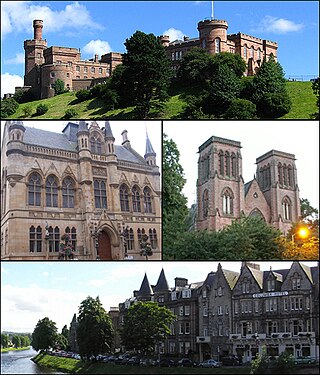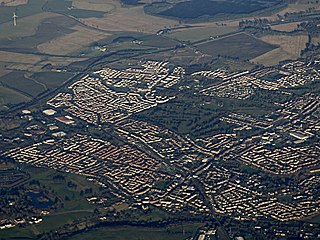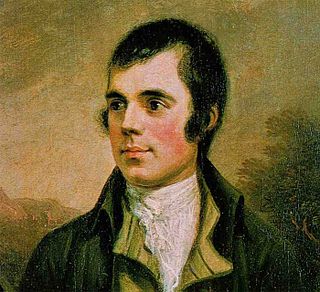
Inverness is a city in the Scottish Highlands, having been granted city status in 2000. It is the administrative centre for The Highland Council and is regarded as the capital of the Highlands. Historically it served as the county town of the county of Inverness-shire. Inverness lies near two important battle sites: the 11th-century battle of Blàr nam Fèinne against Norway which took place on the Aird, and the 18th century Battle of Culloden which took place on Culloden Moor. It is the northernmost city in the United Kingdom and lies within the Great Glen at its northeastern extremity where the River Ness enters the Beauly Firth. At the latest, a settlement was established by the 6th century with the first royal charter being granted by Dabíd mac Maíl Choluim in the 12th century. Inverness and Inverness-shire are closely linked to various influential clans, including Clan Mackintosh, Clan Fraser and Clan MacKenzie.

Crieff is a Scottish market town in Perth and Kinross on the A85 road between Perth and Crianlarich, and the A822 between Greenloaning and Aberfeldy. The A822 joins the A823 to Dunfermline. Crieff has become a hub for tourism, famous for whisky and its history of cattle droving. Attractions include the Caithness Glass Visitor Centre and Glenturret Distillery. The nearby Innerpeffray Library is Scotland's oldest lending library. St Mary's Chapel beside it dates from 1508. Both are open to the public: the library is run by a charitable trust; the chapel is in the care of Historic Scotland.

Harpenden is a town and civil parish in the City and District of St Albans in the county of Hertfordshire, England. The population of the built-up area was 30,240 in the 2011 census, while the population of the civil parish was 29,448. Harpenden is a commuter town, with a direct rail connection to Central London and property prices well over triple the national average.

Highland games are events held in spring and summer in Scotland and other countries with a large Scottish diaspora, as a way of celebrating Scottish and Celtic culture, especially that of the Scottish Highlands. Certain aspects of the games are so well known as to have become emblematic of Scotland, such as the bagpipes, the kilt, and the heavy events, especially the caber toss and weight over bar. While centred on competitions in piping and drumming, dancing, and Scottish heavy athletics, the games also include entertainment and exhibits related to other aspects of Scottish and Gaelic cultures.

Stenhousemuir is a town in the Central Lowlands of Scotland. It lies within the Falkirk council area of Scotland. The town is 2 miles north-northwest of Falkirk and directly adjoins to Larbert in the west, where the nearest rail access is located. The villages of Carron and Carronshore adjoin Stenhousemuir to the east but to a lesser extent. At the 2001 census it showed that it had a resident population of 10,351 but according to a 2009 estimate this was revised to around 10,190 residents. The combined population of the four localities in 2011 was 24,722, representing about 15% of the Falkirk council area total.

The Scotland national rugby league team represent Scotland in international rugby league football tournaments. Following the break-up of the Great Britain team in 2008, Scottish players play solely for Scotland, apart from occasional Southern Hemisphere tours, for which the Great Britain team is expected to be revived. The team is nicknamed the Bravehearts.

Aberfeldy is a burgh in Perth and Kinross, Scotland, on the River Tay. A small market town, Aberfeldy is located in Highland Perthshire. It was mentioned by Robert Burns in the poem The Birks Of Aberfeldy.

Sport in the United Kingdom plays an important role in British culture and the United Kingdom has played a significant role in the organisation and spread of sporting culture globally. In the infancy of many organised sports, the Home Nations, England, Scotland, Wales, and Ireland were heavily involved in setting out the formal rules of many sports, and formed among the earliest separate governing bodies, national teams and domestic league competitions. After 1922, some sports formed separate bodies for Northern Ireland, though many continued to be organised on an all-Ireland basis. For this reason, in many though not all sports, most domestic and international sport is carried on a Home Nations basis, and England, Wales, Scotland and Ireland are recognised as national entities.

Loretto School, founded in 1827, is an independent boarding and day school for boys and girls aged 0 to 18. The campus occupies 85 acres (34 ha) in Musselburgh, East Lothian, Scotland.

Strathallan School is a private boarding and day school in Scotland for boys and girls aged 7–18. The school has a 153-acre (62-hectare) campus at Forgandenny, a few miles south of Perth.
Allister Hogg is a Scottish rugby union footballer who plays at either flanker or number eight formerly for Scotland and vice-captain for Newcastle Falcons.

Kirkcaldy Rugby Football Club is a rugby union club from Kirkcaldy, Fife, Scotland. The men's side currently plays in Scottish National League Division Two and the women's side currently plays in Scottish Womens Midlands & East One.

Gleneagles railway station serves the town of Auchterarder in Perth and Kinross, Scotland.

Sport plays a central role in Scottish culture. The temperate, oceanic climate has played a key part in the evolution of sport in Scotland, with all-weather sports like association football and golf dominating the national sporting consciousness. However, many other sports are played in the country, with popularity varying between sports and between regions.
White South Africans generally refers to South Africans of European descent. In linguistic, cultural, and historical terms, they are generally divided into the Afrikaans-speaking descendants of the Dutch East India Company's original settlers, known as Afrikaners, and the Anglophone descendants of predominantly British colonists of South Africa. In 2016, 57.9% were native Afrikaans speakers, 40.2% were native English speakers, and 1.9% spoke another language as their mother tongue, such as Portuguese, Greek, or German. White South Africans are by far the largest population of White Africans. White was a legally defined racial classification during apartheid.

New Orleans is home to a wide variety of sporting events. Most notable are the home games of the New Orleans Saints (NFL) and the New Orleans Pelicans (NBA), the annual Sugar Bowl, the annual Zurich Classic and horse racing at the Fair Grounds Race Course. New Orleans has also occasionally hosted the Super Bowl, College Football Playoff semifinal game and the NCAA college basketball Final Four.

Sport in Wales plays a prominent role in Welsh culture. Like the other countries of the United Kingdom, Wales enjoys independent representation in major world sporting events such as the FIFA World Cup and in the Rugby World Cup, but competes as part of Great Britain in some other competitions, including the Olympics.
Bill Anderson was a Scottish heavyweight sportsman. He won the World Highland Games Championships in 1981 and the Scottish Highland Games Championships 16 times. He has also held every possible Scottish record in Highland Games.
Strength athletics in the United Kingdom and Ireland has a long history going back many centuries before the televisation of strongman competitions in the 1970s. The ancient heritage of the sport in the United Kingdom and Ireland lies in a number of traditional events, the most famous of which is arguably the traditional Highland Games, which itself is a source of many events now practised in modern strongman competitions, such as World's Strongest Man and International Federation of Strength Athletes (IFSA) sponsored events. However, the traditional events still are popularly contested events today. In the more modern phenomenon that is the World's Strongest Man and its associated competitions, the United Kingdom and Ireland remain well represented with Eddie Hall, Terry Hollands, and former competitor Glenn Ross and John Ryan Cappalahan respectively with regular appearances at world finals, and with three men having won the title of World's Strongest Man, as well as Shane Davis Cappalahan appearing in eight final events.

Homecoming Scotland 2009 was a series of events designed to attract people of Scottish ancestry to visit Scotland. The campaign, organised by EventScotland and VisitScotland on behalf of the Scottish Government, and part-financed by the European Regional Development Fund, claimed that "for every single Scot in their native land, there are thought to be at least five more overseas who can claim Scottish ancestry."















